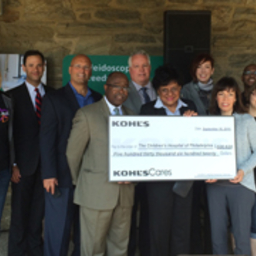
Unique Fetal Surgery Patient Reunion in Chicago Hosted By The Children’s Hospital of Philadelphia
Sep 21, 2014
Midwest families, including patients treated while still in the womb, reunite with their Pennsylvania doctors and nurses.
The Poison Control Center (PCC) at CHOP offers poison prevention education and a 24-hour hotline for poisoning incidents.

Sep 21, 2014
Midwest families, including patients treated while still in the womb, reunite with their Pennsylvania doctors and nurses.

Sep 16, 2014
The donation will to support the injury prevention programs at The Children's Hospital of Philadelphia. Since 2000, Kohl’s has donated more than $7.28 million to CHOP.
Jul 1, 2013
Genetic testing can help us better estimate risk for inhibitor formation, since inhibitors are more common with certain mutations causing hemophilia.

Sep 18, 2014
The Community Health and Literacy Center will offer healthcare, literacy and recreational services in one location for children and families in South Philadelphia.
Nov 4, 2013
CAS is a neurologically-based speech disorder in which there is a disruption in the motor planning for speech production, typically without muscle weakness.

Sep 1, 2014
Learn about how a new multicenter, surgical consortium is working to advance care and surgical treatment for children with bladder exstrophy.
Sep 2, 2014
The Cancer Center at CHOP invites the community to raise awareness and fund research to cure childhood cancer.
Aug 27, 2014
CHOP scientists altered red blood cells to produce a form of hemoglobin not affected by the mutation that causes sickle cell disease. The findings may lead to a new therapy for the disease.
Aug 26, 2014
Specialists at CHOP's Center for Fetal Diagnosis and Treatment report on 100 recent cases of fetal surgery for spina bifida, achieving results similar to the landmark clinical trial that established a new standard of care for prenatal repair of spina bifida.
Jul 7, 2014
It's summer, and when it gets hot, our bodies sweat to help regulate our body temperature. But for some people, sweating in much greater amounts than necessary happens regardless of the temperature. This condition is called hyperhidrosis. In most cases, hyperhidrosis occurs for no apparent reason.